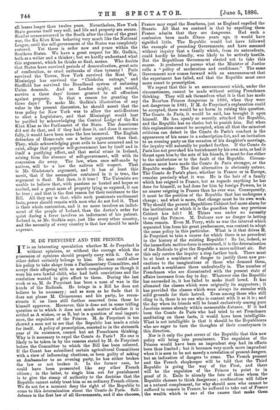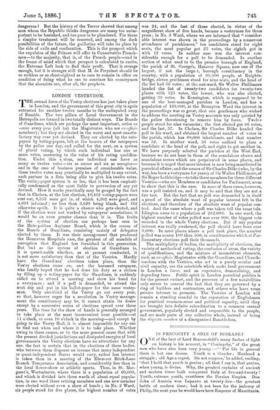M. DE FREYCINET AND THE PRINCES.
IT is an interesting speculation whether M. de Freycinet is without opinions, or without the courage which the
possession of opinions should properly carry with it. One or other defect certainly belongs to him. No man could allow his policy to take shape from a Parliamentary Committee, and accept their offspring with as much complacency as though it were his own lawful child, who had both convictions and the resolution wanted to give effect to them. During the last week or so, M. de Freycinet has been a nose of wax in the hands of the Radicals. He brings in a Bill he does not believe to be necessary ; and as soon as he finds that it does not please M. Clemenceau and his party, he recon- structs it on lines still further removed from those he himself approves. Moreover, this is done not in some trifling question as to which it does not much matter whether it is settled as A wishes, or as B, but in a question of real import- ance, the expulsion of the Princes. M. de Freycinet is too shrewd a man not to see that the Republic has made a crisis for itself. A policy of proscription, resorted to in the sixteenth year of its existence, cannot but set Frenchmen thinking. Why is it necessary to expel the Comte de Paris ? No one is likely to be taken in by the reasons stated by M. de Freycinet before the Committee to which the Bill has been referred. If the Count has subsidised certain agricultural Committees with a view of influencing elections, or been guilty of asking an Ambassador to an evening party, he has either broken the law or not broken it. In the former case, he could have been prosecuted like any other French citizen ; in the latter, to single him out for punishment is to give the stamp of authority to the doctrine that the Republic cannot safely treat him as an ordinary French citizen. We do not for a moment deny the right of the Republic to come to this determination about the Comte de Paris. Self- defence is the first law of all Governments, and if she chooses, France may expel the Bourbons, just as England expelled the Stuarts. All that we contend is that by expelling them France admits that they are dangerous. Had each a confession been made fifteen years ago, it would have signified little. The Republic would but have followed the example of preceding Governments, and have assumed without inquiry that a family which, from its antecedents, could hardly be friendly, was likely to be actively hostile. But the Republican Government elected not to take this course. It preferred to pursue what the Minister of Justice calls a " policy of moderation and confidence." The same Government now comes forward with an announcement that the experiment has failed, and that the Republic must once more resort to proscription.
We repeat that this is an announcement which, under the circumstances, cannot be made without setting Frenchmen thinking. They will ask themselves what it is that has made the Bourbon Princes dangerous in 1886, when they were not dangerous in 1881. If M. de Freycinet's explanation could be accepted, there would be no harm in raising this question. The Comte de Paris, it would be said, has brought it upon himself. He has, openly or secretly, attacked the Republic, and the Republic has no choice but to punish him. But when this explanation cannot be accepted, when all that the minutest criticism can detect in the Comte de Paris's conduct is the appearance of his name in a subscription-list, and an invitation to an evening party on the occasion of his daughter's marriage, the inquiry will naturally be pushed further. If the Comte de Paris has not provoked his banishment by his own acts, or had it thrust upon him by the acts of his friends, it must be due either to the misfortune or to the fault of the Republic. Circum- stances must have made the Comte de Paris stronger, or the Republic weaker. The first alternative is obviously untrue. The Comte de Paris's place, whether in France or in Europe, remains precisely what it was. He is the heir of a family which has reigned in France, but as regards anything he has done for himself, or had done for him by foreign Powers, he is no nearer reigning in France than he ever was. Consequently, it must be the position of the Republic that has undergone a change ; and what is more, that change must be its own work. Why should the present Republican Cabinet feel more alarm for the institutions of which it is the guardian than any previous Cabinet has felt ? M. Thiers was under no necessity to expel the Princes. M. Dufaure saw no danger in letting them remain. Even M. Ferry, wide as was the interval which separated him from his great predecessors, was content to adopt the same policy in this particular. What is it that drives M. de Freycinet to take a course for which there is no precedent in the history of the existing Republic ? So far, indeed, as the immediate motive-force is concerned, it is the determination of the Radicals to give the Republic a more militant air. But this only carries the inquiry a step further back. There must be at least a semblance of danger to justify these new pre- cautions to the imaginations of those who demand them, and such a semblance there undoubtedly is. The number of Frenchmen who are discontented with the present state of affairs increases from day to day. Whatever else the Republic has succeeded in, it has failed to make itself loved. It has alienated the classes which were originally its supporters ; it has provided the classes which were always its enemies with solid grounds for their hatred. Even among those who still cling to it, there is no one who is content with it as it is ; and the day when its friends will be found exclusively among pare Jacobins seems already within measurable distance. If it had been the Comte de Paris who had tried to set Frenchmen meditating on these facts, it would have been intelligible. What is not intelligible is that it should be the Republicans who are eager to turn the thoughts of their countrymen in this direction.
Nor is it only the past errors of the Republic that this new policy will bring into prominence. The expulsion of the Princes would have been an imprudent step had its effects been thus limited ; but it becomes very much more imprudent when it is seen to be not merely a revelation of present dangers, but an indication of dangers to come. The French peasant and the French shopkeeper will be told that the Third Republic is going the way of the First, and there will be the expulsion of the Princes to point to in proof of it. Exile is already the fate of those whom the Republic chooses to think dangerous ; confiscation will follow as a natural complement, for why should men who cannot be suffered to remain in France, be suffered to take out of France the wealth which is one of the causes that make them dangerous ? But the history of the Terror showed that among men whom the Republic thinks dangerous are many too unim- portant to be banished, and too poor to be plundered. For these a simpler treatment will be reserved, and among the dark possibilities of the future, the guillotine will take its place by the side of exile and confiscation. This is the prospect which the expulsion of the Princes will offer to Conservative French- men—to the majority, that is, of the French people—and in the frame of mind which that prospect is calculated to excite, the Extreme Left look to find their profit. That is strange enough, but it is stranger still that M. de Freycinet should be so reckless or so short-sighted as to care to remain in office on condition of doing what he can to convince his countrymen that the alarmists are, after all, the prophets.



































 Previous page
Previous page